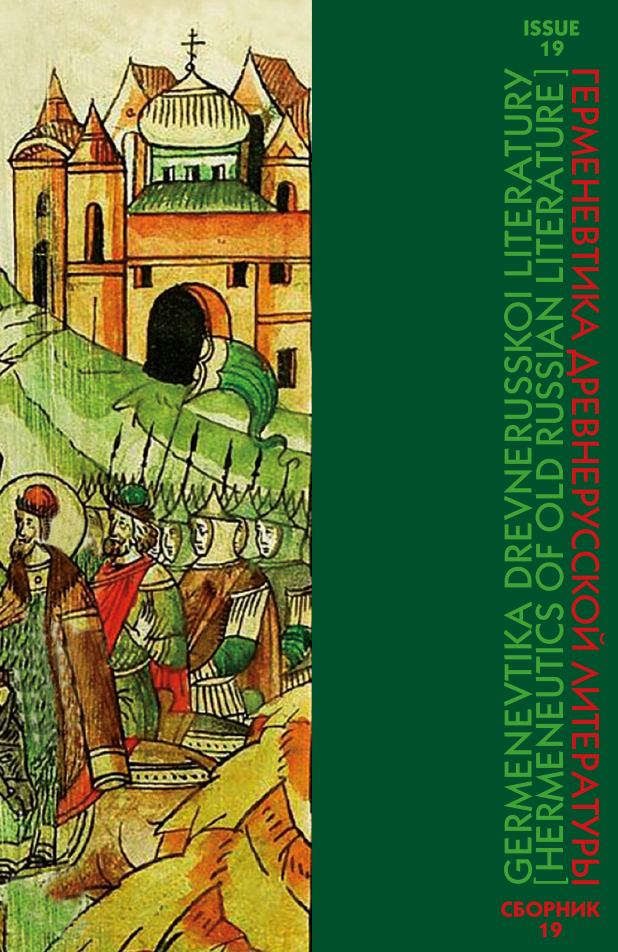Abstract:
A Fable of the Origin of Vinesmoking from the collection of manuscripts by N.P. Rumyantsev (RSL, F. 256, no. 363) belongs to the works cycle on hops (drunkenness) that can be dated to the second half of the 17th century. A.H. Vostokov defined the genre of the work as a fable, while N.I. Kostomarov referred the text to the legendary corpus. Text from Rumyantsev collection is an apocryphal text (tale) associated with the legend On Noah’s Ark. Fable reflects the parable of demon, who, seeing the spread of Christian teachings, decided to teach one person to drink amusements, thereby wishing to “intoxicate” the whole world with his “accusation” as a counterbalance to the Christian trend. In the artistic structure of the collection, Fable is placed in the middle of the collection and opens a cycle of works on the subject of drunkenness, which includes the Tale of the Highly Smart Hops, Word on Lazy and Sleepy and Drunk, Word of the Great St. John Chrysostom on Drunkenness. The five-part structure of Fable is typical for works about the origin of drunkenness that existed in Russia in the 17th–18th centuries. The genre specificity of text is closely related to the peculiarities of parable, legendary form, but without a moralizing (explanatory) component at the end, which may indicate that before us another edition of a legend based on a popular plot. An analysis of text poetics containing expressive and pictorial elements, designed to enhance the impression of what has been read, makes possible to reveal hidden messages to the old Russian reader. The work, which begins the cycle of legends about hops, is organically integrated into literary space of the collection, imparting compositional integrity to collection of the 17th century.
REFERENCES
1 Buslaev, F. “Predislovie” [“Introduction”]. Russkie narodnye pesni, sobrannye P.I. Iakushkinym, P.I. Iakushkin [Russian Folk Songs Collected by P.I. Yakushkin]. [Moscow], Tipografiia V. Gracheva i K°, tsenz Publ., 1860. 89 p. (In Russian)
2 Drevnerusskaia povest’ [An Old Russian Story], issue 1 [Text], comp. V.P. Adrianova-Peretz and V.F. Pokrovskaya; USSR Academy of Sciences. Institute Lit.]. Moscow, Leningrad, Akademiia Nauk Publ., 1940 (Tartu). 326 p. (In Russian)
3 Makhnovets, T.A., Titova, L.V. “‘Povest’ o Khmele’ v literaturnom protsesse XVII veka” [“‘A Tale about Hops’ in the Literary Process of the 17th Century”]. Sibirskii filologicheskii zhurnal, no. 4, 2018, pp. 47–54. DOI: 10.17223/18137083/65/5 (In Russian)
4 Skripil’, M.O. “Povesti o khmele [vtoroi poloviny XVII v.]” [“The Tale of Hops [the Second Half of the 17th Century”]. Istoriia russkoi literatury: v 10 t. [History of Russian Literature: in 10 vols.], vol. II, part 2: Literature of the 1590s–1690s, USSR Academy of Sciences. Moscow; Leningrad, Publishing House of USSR Academy of Sciences, 1948, pp. 287–292. (In Russian)
5 Tarkovskii, R.B. “Basnia v Rossii XVII — nachala XVIII veka” [“Fable in Russia of the 17th — Early 18th Centuries”]. Filologicheskie nauki, no. 3 Moscow, 1966, pp. 97–109. (In Russian)
6 Tufanova, O.A. “The Parables in Ivan Timofeev’s ‘Temporary’: Typology and Artistic Specific.” Germenevtika drevnerusskoi literatury [Hermeneutics of Old Russian Literature]. Issue 20. Ed.-in-chief O.A. Tufanova. Moscow, IWL RAS Publ., 2021, pp. 292–313. (In Russian) https://doi.org/10.22455/HORL.1607-6192-2021-20-292-313






